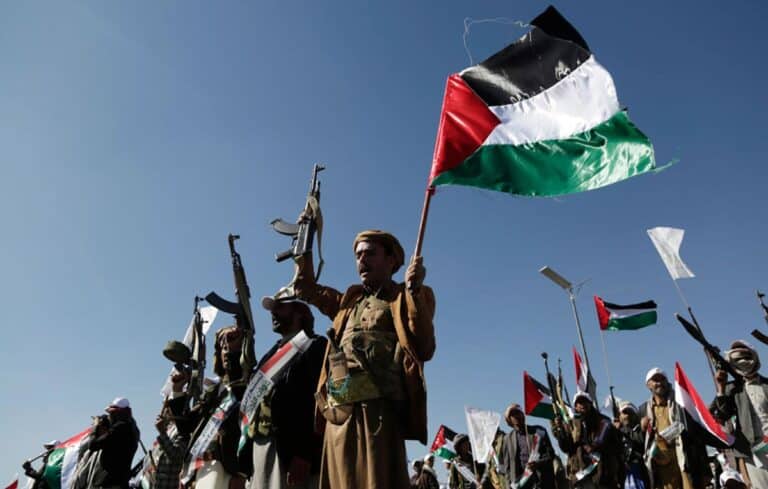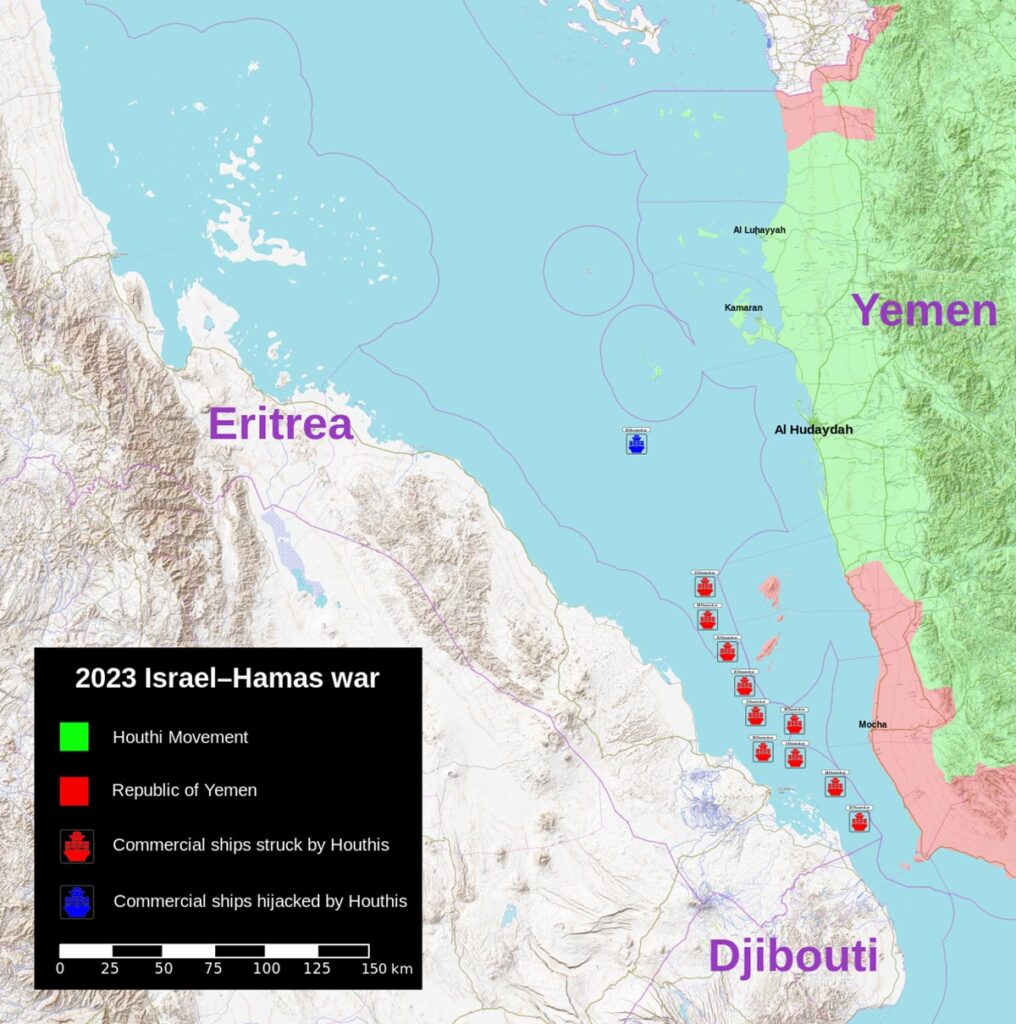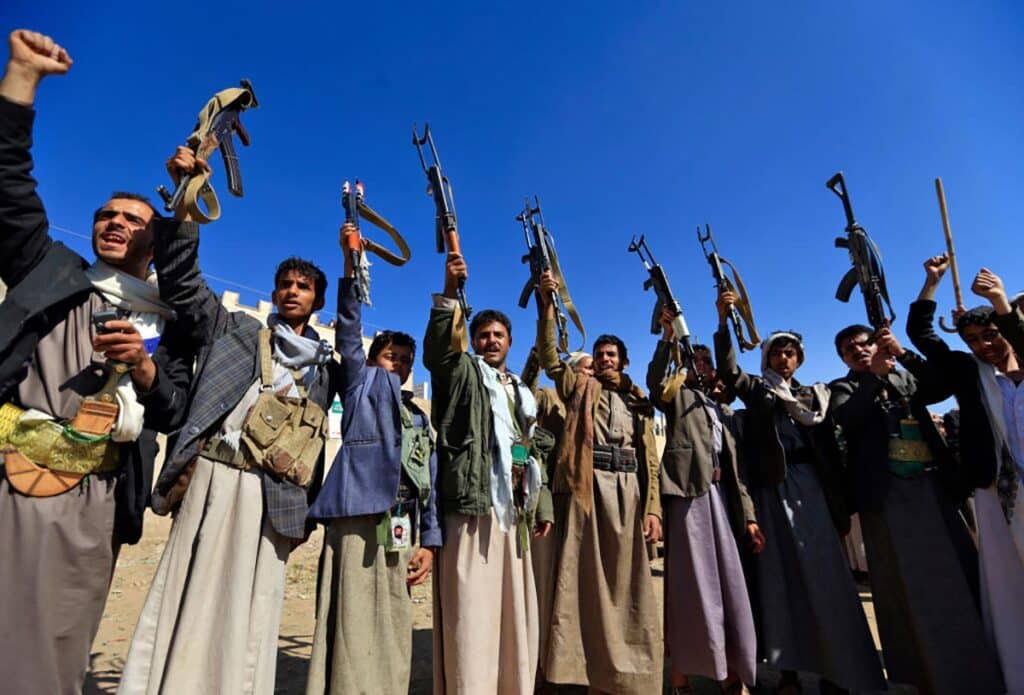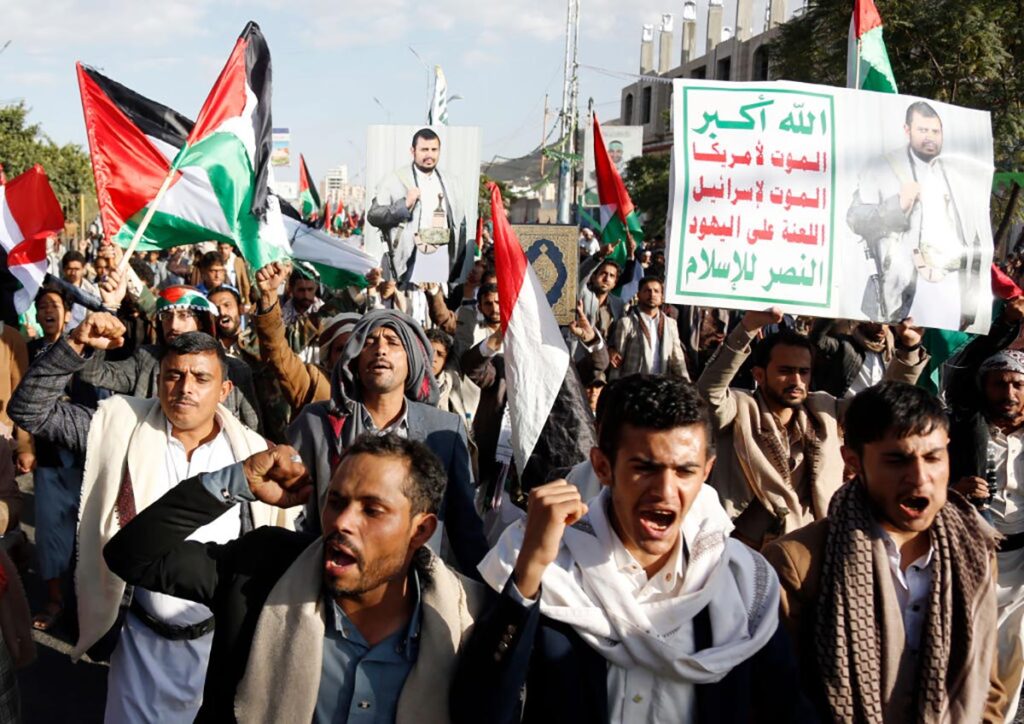
The U.S. and the U.K. carried out airstrikes on Houthi-controlled areas in Yemen on Thursday after weeks of attacks by the Iran-backed rebel group on ships in the Red Sea.
First video coming in from US, UK strikes against Houthis in Yemen. pic.twitter.com/CsTpXeimHV
— FJ (@Natsecjeff) January 12, 2024
U.S. President Joe Biden said that the strikes — which targeted over 60 Houthi militant locations — were a “defensive action” in direct response to the Houthi attacks, adding that he would “not hesitate to direct further measures to protect our people and the free flow of international commerce as necessary.”
Shortly following the outbreak of the Israel-Hamas war, the Houthis began firing missiles and drones toward Israel.
On Nov. 19, they hijacked a cargo ship in the Red Sea. Initially believed to be Israeli, the hijacked vessel was actually British-owned and Japanese-operated. Since then, they have attacked numerous international ships in the Red Sea.

The group says their attacks are to show solidarity with the Palestinian people during the current war, and to press Israel to allow more humanitarian aid into the Strip.
Analysts say their attacks on international ships — not all of which have been linked to Israel — “could be intended to inflict economic pain on Israel’s allies in the hope they will pressure it to cease its military offensive,” CNN reported.
Many shipping companies — including Maersk, Hapag-Lloyd and the oil company BP — have diverted their ships to avoid hijackings and stopped shipping to Egypt and Israel due to the attacks.
Let’s unpack who this Iran-backed group is and why they have joined the fight against Israel.
Who are the Houthis?

The Houthis, also known as the Ansar Allah organization, are a Shiite Islamist group that controls much of Yemen. Founded in the mid-1990s by Hussein al-Houthi, the group initially started as a moderate political movement.
Their early opposition was directed toward the Yemeni government’s ties with Saudi Arabia and their perception of corruption within then-President Ali Abdullah Saleh’s administration.
Initially non-violent, the group primarily promoted its ideology through educational and youth programs. However, they radicalized after 2003, following the American invasion of Iraq and the rise of terror groups like Al-Qaeda in Yemen.
In 2009, the Houthis invaded and waged war on Saudi Arabia, prompting Saudi airstrikes in response.
In 2011, during the Arab Spring Revolt, millions of Yemenis protested against Saleh’s regime and demanded his resignation.
As the regime weakened, the Houthis took advantage of the country’s unrest. By 2014, they had gained control of Yemen’s capital city, Sanaa, as well as the Red Sea port.
They staged a coup and seized control of Yemen’s government, forcing then-president Abdrabbuh Mansur Hadi to flee. This sparked a violent and ongoing civil war.
Since then, the Houthis have become a major military force in Yemen, receiving weapons, funding and training from Hezbollah and Iran.
The Houthis have been led by Hussein al-Houthi’s brother, Abdul Malik al-Houthi, who has served as the group’s spiritual, military, and political leader since 2007.
The Houthis’ ideology

The Houthis’ ideology is captured in their slogan, which reads in Arabic, “God is great, death to America, death to Israel, curse the Jews, victory to Islam.”
Influenced by Hezbollah and the Iranian Revolution, the Houthi movement has publicly expressed vehemently anti-American, anti-Israel, and antisemitic rhetoric for many years.
Geopolitically, they hold a unique position in the Middle East. Being an avowed enemy of Saudi Arabia, the Houthis are a natural ally to their largest foreign backer, Iran. They are a part of the Iran-backed “axis of resistance” of groups fighting against Israel.
Are the Houthis a terror group?
On Jan. 12, President Biden said he believes the Houthis are a terror group, marking a shift in his administration’s approach to the Iran-backed rebels.
Reporter: “The bombing of the Houthis — if the attacks don't stop, will you continue with the strikes?”
— The Recount (@therecount) January 12, 2024
President Biden: “We will make sure that we respond to the Houthis as they continue this outrageous behavior, along with our allies.” pic.twitter.com/xJoXA6fcdL
The U.S., under the Trump administration, designated them as terrorists in January 2021. In February 2021, shortly after taking office, Biden revoked this status, citing concerns that the designation could hinder humanitarian aid efforts to Yemen.
Yemen, the UAE, Saudi Arabia, and Malaysia consider the Houthis to be a terror group.
How are they involved in the current Israeli-Hamas conflict?

Since Oct. 7, the IDF has fought against Hamas and other Iran-backed groups that are part of the “axis of resistance,” including Palestinian Islamic Jihad, Hezbollah, and the Houthis.
The Houthis declared its support for Hamas on Oct. 7 and soon initiated attacks against southern Israel using cruise missiles and drones.
However, these attacks have been largely neutralized by U.S., Saudi and Israeli defenses, including Israel’s long-range Arrow air defense system.
Footage shows the Arrow air defense missile launch earlier over Eilat, taking out a ballistic missile fired by Yemen's Houthis. pic.twitter.com/RFqgoelOQQ
— Emanuel (Mannie) Fabian (@manniefabian) December 6, 2023
How will their involvement impact the rest of the war?
The extent of the Houthis’ capability to inflict damage on Israeli civilians or infrastructure remains to be seen. That being said, the movement is a prime example of just how far Iran’s proxy network has expanded throughout the Middle East.
The Houthis have been responsible for ballistic drone and rocket attacks on Eilat, which has historically avoided Hamas rocket fire.
Despite the lack of damage caused by their long-range attacks, the Houthis are now very much part of the current conflict, creating a third front for Israeli defenses to counter in addition to Hamas in Gaza and Hezbollah in southern Lebanon.
Originally Published Jan 12, 2024 04:02PM EST
